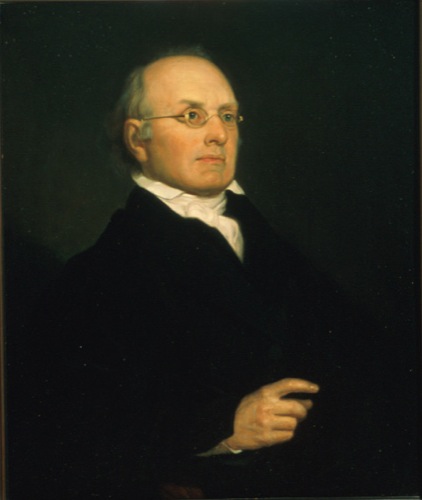Joseph Story

Joseph Story in 1844. Justice Joseph Story, a lawyer, jurist, and prolific writer of legal treatises, was one of the most renowned constitutional scholars in American history and arguably the greatest scholar ever to serve on the Supreme Court. His Court opinions and his writings reveal his perspective on First Amendment issues. Story believed that a civilized society would be difficult to sustain without moral freedom and virtue. It was the duty of government to support religion, especially the Christian religion, yet government should not encroach on the freedom of any person’s religious beliefs. In two religion cases heard by the Court, Lynch v. Donnelly (1984) and Wallace v. Jaffree (1985), the majority cited Story’s influential Commentaries on the Constitution of the United States (1833) on the relationship between church and state. (Photo via Library of Congress's Prints and Photographs division)
Joseph Story (1779–1845), a lawyer, jurist, and prolific writer of legal treatises, was one of the most renowned constitutional scholars in American history and arguably the greatest scholar ever to serve on the Supreme Court. His Court opinions and his writings reveal his perspective on First Amendment issues.
Story believed that a civilized society would be difficult to sustain without moral freedom and virtue. It was the duty of government to support religion, especially the Christian religion, yet government should not encroach on the freedom of any person’s religious beliefs. In two religion cases heard by the Court, Lynch v. Donnelly (1984) and Wallace v. Jaffree (1985), the majority cited Story’s influential Commentaries on the Constitution of the United States (1833) on the relationship between church and state.
Story was the youngest justice ever appointed to the Court
Story, the son of a physician, was born in Marblehead, Massachusetts, into a patriotic Federalist and Calvinist family. He attended Marblehead Academy before enrolling in Harvard College, where he studied law and politics and graduated second in his class in 1798. After reading law, he was admitted to the Massachusetts bar in 1801.
Because of his political leanings toward Thomas Jefferson and the Democratic Republicans, he at first had difficulty establishing a law practice in the city of Salem, which was dominated by the Federalists, but he eventually made a name for himself in the courts of Salem and in the Massachusetts Supreme Judicial Court. In 1805 Story was elected to the Massachusetts legislature and in 1808 to the U.S. House of Representatives, where he served one term. He argued before the U.S. Supreme Court in a land-speculating case, Fletcher v. Peck (1810). The Court struck down the Georgia law, and Story’s reputation grew.
In 1811, after the death of Justice William Cushing, President James Madison appointed Story to the Supreme Court, even though Story was only 32 and his political loyalty to the Jeffersonians was questionable. He was the youngest justice — before or since — to sit on the Court. During his tenure, Story wrote several landmark opinions, including Martin v. Hunter’s Lessee (1816), Dartmouth College v. Woodward (1819), and Swift v. Tyson (1842). He supported Chief Justice John Marshall in Marshall’s beliefs about the importance of the federal judiciary as a coequal branch of government and the supremacy of the Supreme Court.

Story thought Christianity was part of the common law
Story and Jefferson had different views about the place of religion in state government and in the common law. Jefferson did not believe that Christianity was part of the common law; therefore, church and state should be kept separate. Story disagreed. He wrote opinions in the first two Supreme Court cases involving the relationship between church and state.
In Terrett v. Taylor (1815), the Court unanimously struck down an 1801 Virginia law directing the Episcopal Church’s lands in the state to be sold. Story wrote for the Court that the state could neither deny to members of a religious corporation the right to retain their corporate charter nor deny to the church the right to retain and use its property.
A later case, Vidal v. Girard’s Executors (1844), involved a bequest of several million dollars to the city of Philadelphia for the benefit of orphans, providing that no religious persons be admitted to the establishment. Again writing for a unanimous Court upholding the provisions of the will, Story reasoned that the guarantee of religious freedom in the state’s constitution was broad and extended equally to all sects.
Story considered retiring from the Court when Andrew Jackson was elected president in 1828, because of his low opinion of Jacksonian democracy, but he died before he could retire. As well as serving on the Court, he was Dane Professor of Law at Harvard from 1829 until his death.
This article was originally published in 2009. Dr. Judith Ann Haydel (1945-2007) was a political science professor at the University of Louisiana-Lafayette and McNeese State University.
No comments:
Post a Comment